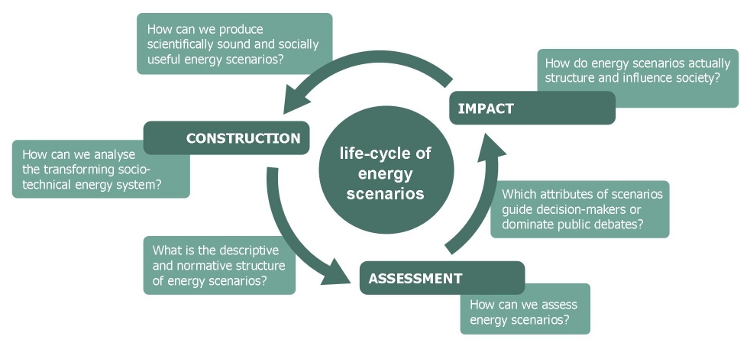Subject
Visions of future developments exert a strong influence on human thinking, on decision-making in politics and the economy, and on public debate. This is particularly true in the field of energy policy, which is associated with long timescales and high uncertainties. As there is still a need for quantitative decision support in the energy sector, especially as new challenges are continuously appearing here, new methods should also be continuously developed. Decisions made today depend, on the one hand, on assumptions about and goals for the future (energy demand, availability of new technologies, greenhouse gas reduction targets etc.) and, on the other, determine some parts of the energy system for decades to come. Therefore, it is crucial for scientific research to develop 'reliable', 'rational' and 'robust' energy scenarios for the relevant decision-making processes and the general public.
However, delivering such reliable energy scenarios is a comprehensive and complex issue. At present, we are (again) experiencing a very unstable development. Economic crises, decentralised electricity generation, climate change, local unrest, increasing transport demand and energy shortages pose tremendous challenges to providing a sustainable energy system. Guaranteeing the future security of energy supply will be more difficult than in the past. Forecasting primary energy resources and energy supply depends on numerous parameters in many scientific disciplines: Engineers may be able to predict the development of different technologies, sociologists can estimate the acceptance of new technologies and changes in behaviour; other disciplines might suggest an optimal implementation strategy, economists design efficient policy instruments, those specialising in new technologies (i.e. renewable energies) appreciate the potentials of these energies and philosophers are concerned with epistemological issues or assessment criteria.
Energy scenarios for decision-making are urgently needed, but harder to provide under these boundary conditions. It is true that a large set of energy scenarios is already available. However, these differ considerably and, in many parts, contradict each other. It is becoming more and more important to establish competencies and methods to assess and compare diverging scenarios with regard to their basic assumptions, premises, biases, strengths and weaknesses . Most energy scenarios are based on system models with a wide variety of assumptions. Each model has a certain focus and differs mainly with respect to: its variables (1) and their disposal (exogenous versus endogenous) (2), their interrelationships (3) as well as its (often implicitly formulated) system boundary (4). In times of rapidly evolving energy markets, verifying these models is hardly possible. This is due to the huge uncertainty in this complex system and the fundamental dichotomy in science: Are theoretical concepts, empirical time series models or expert judgements more appropriate to represent the underlying system? Hence, any interpretation of energy scenarios must be grounded in a holistic understanding of the underlying models, including their corresponding assumptions and system boundaries.
First, this requires knowledge about how these scenarios are constructed, a better understanding of the implicit and explicit assumptions that structure the scope of what is covered in the scenarios and knowledge about the underlying modelling and simulation techniques. Second, a methodological frame for assessing energy scenarios is needed, including the criteria and routines for applying this in concrete cases. Third, energy scenarios have impacts in different contexts of reception and decision-making. However, up to now, little is known about their concrete application.

The entire 'life cycle' of scenarios, which ranges from their construction, through assessment to their impacts, thus indicates a huge variety of research questions which can only be solved by considering all three aspects. A robust framework for assessing energy scenarios can only be developed if this considers their construction principles as well as their specific impacts of use. This strong connectivity of the topics makes an interdisciplinary approach unavoidable which is why this is a core principle of the Helmholtz Research School on Energy Scenarios.
